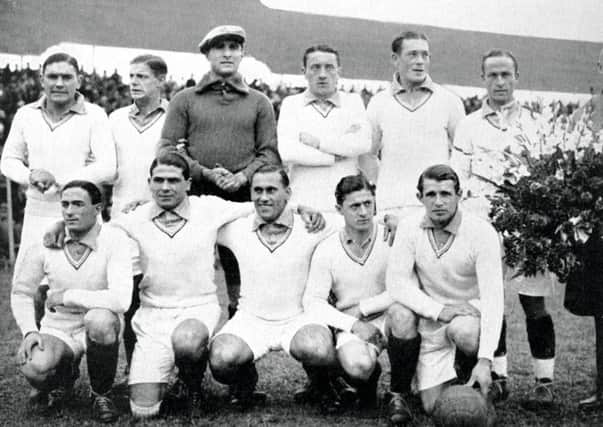Alex Villaplane: France captain turned Nazi officer


The history of the World Cup has encompassed many disparate characters, both heroes and villains, but it is doubtful if there is a more repugnant tale than that of Alex Villaplane, who captained France in the inaugural World Cup in Uruguay in 1930.
Villaplane declared that the honour of leading France against Mexico in the first match in the tournament’s history was the happiest day of his life. But his life was to end in infamy when the once-celebrated footballer, by then a murderer and gangster, was executed for collaborating with the Nazis during the occupation of France in the Second World War.
Advertisement
Hide AdAdvertisement
Hide AdVillaplane was born in Algeria in 1905, but was resident in France when he signed for FC Sete in 1921. Under Victor Gibson, the club’s Scottish manager, who championed the player, Villaplane blossomed as a centre half and wing half. He was an outstanding all-round footballer renowned for his tough tackling, incisive passing and great ability in the air. He won the first of his 25 caps in 1926, and by the time of the 1930 World Cup, was an automatic choice for the French side. But nowhere is it written that a talented footballer has to be a stand-up human being, and even before the World Cup, Villaplane had a reputation as a mercenary, changing clubs at will for the lure of a bigger pay packet.
After his move to Racing Club de Paris in 1929, he also had no compunction about flaunting his wealth around Paris in an era which was still officially, but not in practice, amateur. It was during this period that Villaplane first sowed the seeds of his destruction and his descent into moral turpitude began as he immersed himself in the Parisian underworld.
Villaplane returned from Uruguay with his playing reputation enhanced and it should have led to greater things on the football field. However, his next club, Antibes, became embroiled in a match-fixing scandal in 1932, with Villaplane a suspected ringleader. He then went through the motions with Nice before teaming up with his former mentor Gibson at lowly Bastidienne de Bordeaux, but Villaplane was by now a lost cause and the Scot soon sacked him.
Full rein was then given to Villaplane’s baser instincts and in 1935 he was imprisoned for fixing horse races. Several other prison terms for racketeering and blackmail followed, and it was during one of these sentences in a Paris gaol that Villaplane was recruited by Henry Lafont, an infamous figure in the French collaboration with the Nazis.
The Nazi occupation of Paris afforded unlimited scope for venal opportunists like Lafont, who was instrumental in the destruction of the Belgian resistance network, and disgraced former head of the French police, Pierre Bonny. The pair headed the French Gestapo, a gang of murderous thugs whose calling cards were the betrayal, torture and murder of Jews, resistance members, and anyone else who took their fancy, all with the aim of capitalising on the Nazi occupation and making themselves very rich. They wore SS uniforms and in Villaplane the gang found someone who enthusiastically embraced their murderous and avaricious goals. In 1944, Villaplane’s Algerian heritage led to him being installed as the commander of the Brigade Nord Africain, an immigrant unit which had been set up to counter the increased French resistance in the southern regions of the country.
Wearing the uniform of an SS sub-lieutenant, he was known as “SS Mohammed” and his unit soon earned a reputation for merciless cruelty. There were many atrocities orchestrated by Villaplane, and according to survivors, Villaplane did personally take part in at least one massacre, when 11 resistance members were executed in the village of Mussidan, with Villaplane himself shooting the prisoners. But Villaplane’s motivation had always been money and by now he had perfected a blackmail routine aimed at extracting huge sums of money from those in fear of their lives. His modus operandi consisted of lamenting about the circumstances he found himself in – a Frenchman forced to wear the German uniform, but claiming that he could in fact save their lives – at a price, usually 400,000 francs. When those that could pay did pay, they were left to the “mercy” of his thugs.
When Paris was liberated in 1944, the French Gestapo leaders were hunted down and tried. The prosecutor described how Villaplane’s unit pillaged, raped, robbed and killed their victims as Villaplane looked on…“calm and smiling, cheerful, almost invigorated”.
Inevitably found guilty of treason, Villaplane was executed by firing squad along with Bonny and Lafont on 26 December 1944. His body was buried in an unmarked grave, and his story air-brushed from history for decades.
Advertisement
Hide AdAdvertisement
Hide AdSo, when did the footballer die and the monster take over? Was there some massive, earth-moving event in Villaplanes’s early life that provoked this radical decline into barbarity? All the evidence says no.
To Villaplane, football was just a means of making money, and he looked upon the war and the Nazi occupation in the same way. In his trial, the prosecutor described him as “a born crook” but it appears that Alex Villaplane was just an evil human being who happened to be a very good footballer.